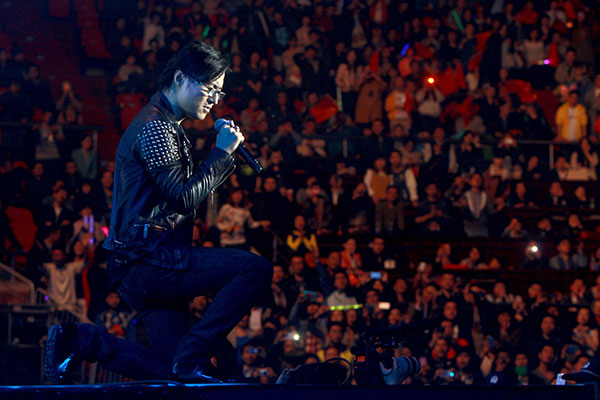
Chinese rock singer-songwriter Wang Feng holds a concert in Tianjin in April. Wang’s Beijing concert in July was streamed online.[Photo/Xinhua]
Chinese music lovers are shifting from buying physical records to watching live music shows, a new report indicates.
The First China Music Industry Forum, which was jointly organized by the State Administration of Press, Publication, Radio, Film and Television, the Communication University of China and the Music Industry Promotion Committee, reported on Nov 6 in Beijing that the total size of China’s music performance market reached 14 billion yuan ($2.28 billion) in 2013, while the total size of physical record industry was 650 million yuan.
The report also says that the total size of China’s music industry in 2013 exceeded 270 billion yuan, making it bigger than the film industry valued at 20 billion yuan and the TV series industry, which was 10.8 billion yuan.
“An increasing number of people in China, especially the young generation, are embracing live music as an important medium of entertainment,” says Zhao Zhi’an, the deputy director of School of Music and Recording Arts at CUC.
“For example, over 200 outdoor music festivals are expected to be held in 2015. It’s a good time for both artists and fans.”
Zhang Youdai, a veteran DJ and a seasoned concertgoer who is credited with introducing many Western and Chinese rock musicians to Chinese fans, says his first live concert experience was in 1987.
Then he was a student of Central Academy of Drama. He bought three tickets to see the Chinese godfather of rock ‘n’ roll, Cui Jian, for 5 yuan each and went to the concert with two of his classmates.
“Few people went to live shows back then but it was the golden era, from 1987 to 1997, that gave birth to a number of great indie musicians who are the backbone of today’s live music scene,” says Zhang, who discussed China’s rock music scene at the forum.

LeTV.com, a Chinese video-and movie-streaming site, has begun streaming live concerts of the country’s musicians.[Photo/China Daily]
Gao Hu came to Beijing from Shandong province and formed the rock band Miserable Faith with his friends in 1999. They rented a small house at around 175 yuan a month and could barely make ends meet because they had few opportunities to perform, he says. But now, they perform around the country every month.
“As an indie rock band, we not only can survive by playing our music but also have extra money to buy better equipment and instruments,” he says.
As the first annual official music industry report in China-which contains 13 branch reports covering the physical record industry, digital music industry, music performance industry and music copyrights-the report also declares other boosts for the music industry include charging for digital music and the new business model of collaboration between music labels and video websites.
According to the report, the total size of China’s digital music industry in 2013 was more than 44 billion yuan. It was around 39 billion yuan the year before. There were more than 450 million digital-music users in China in 2013.
In July 2014, Chinese video and movie streaming site LeTV.com cut an exclusive deal to stream the concert of Chinese rock singer-song writer Wang Feng on Aug 2 at the National Stadiumin Beijing. More than 75,000 users watched the concert online within two days, with each user paying 30 yuan. It was considered to be a groundbreaking new business model for China’s music industry.
Yin Liang, the music department director of LeTV.com and a participant in the forum, confirmed earlier reports that LeTV.com had gained the right to exclusively stream the future trip to outer space of HongKong singer-songwriter Tang Tszkei, who is better known by her stage name, G.E.M.
In October, the 23-year-old singer announced her plan to be the first Chinese female pop singer to visit outer space, and she has taken a space-training course in Amsterdam.
“The music industry should be integrated with other industries to offer many more commercial possibilities,” says Yin.
However, he is concerned about the quality and content of music since more and more singers in China, especially in the pop music world, are performing at commercial concerts but creating fewer “good works”.
“I believe that good and creative content is the key to making profits, which, unfortunately, has been ignored by some artists and record companies,” he says.
Liu Yuxing, the general manager of China Mobile Music Base, says that since the facility was founded in 2006, it has made immediate profits thanks to the fast development of the Internet in China.
Inspired by the popular singing reality shows in China, Liu says that the company launched a platform early this year for original Chinese singer-songwriters.
“So far, we have more than 5,000 singer-songwriters who’ve signed contracts with us. We will help inject new blood into the music industry,” Liu says.
Guo Biao, the chief representative of the International Federation of the Phonographic Industry in China, agrees that the Internet presents a tremendous opportunity for artists and music labels.
But copyright piracy is still a challenge, he says, since there is no official standard of paying for music copyrights in China.
In 2013, for the first time, China’s music copyrights revenue exceeded 100 million yuan, according to the nonprofit Music Copyright Society of China, which shows the success of converting consumers from free downloads to a paid model.
“Besides the legal music awareness of consumers, the government should pave way for legislation, regulating the legal use of music, such as at karaoke bars and in public places,” Guo says.
